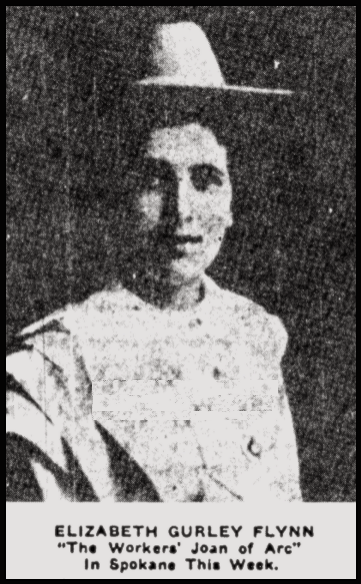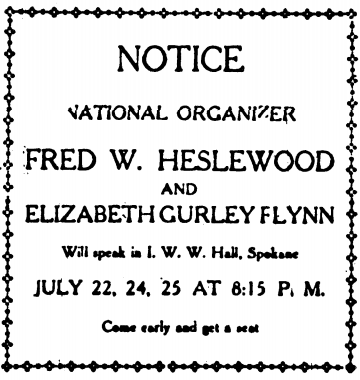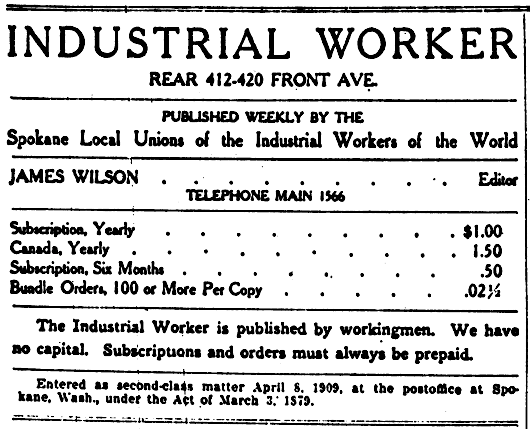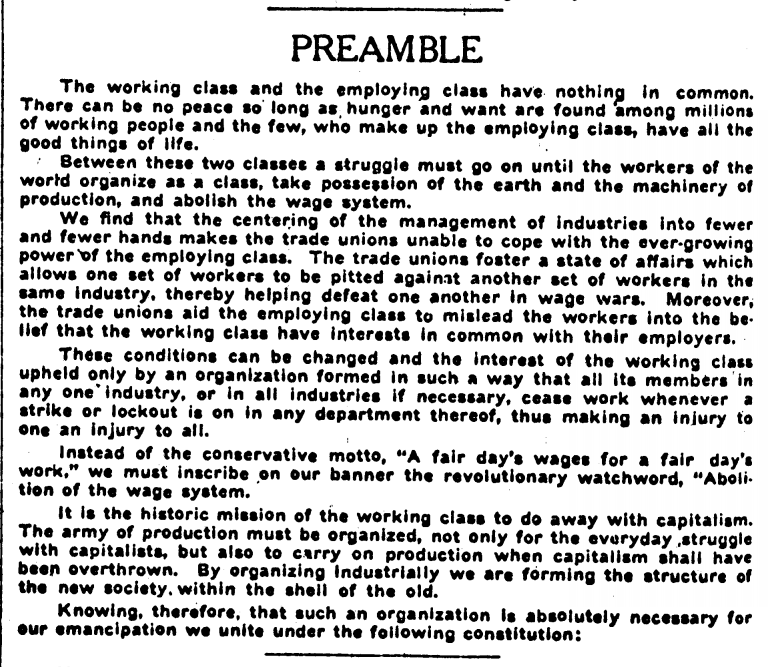 ———-
———-
Hellraisers Journal – Wednesday July 28, 1909
Spokane, Washington – June 29th Speech of Gurley Flynn, Part IV
From the Spokane Industrial Worker of July 15, 1909:
ELIZABETH G. FLYNN ADDRESS TO WORKERS
—–(Concluded From Last Week)
Address of Miss Elizabeth Gurley Flynn, Organizer and Lecturer of the Industrial Workers of the World, given at Spokane, Wash., on Tuesday evening, June 29, 1909.
Employers Unite Industrially.
The tobacco trust is organized from the tobacco fields straight through all the productions to the United States cigar stores and sell it over the continent; the American woolen trust, from the backs of the sheep clear through the mills, where the cloth is sold to the wholesaler; the beef trust is organized from the ranchers of the West through the slaughter houses and packing houses, and even in through the tannery, where leather is tanned, and they are now grasping out for the shoe factories, where the shoes are made.
Everywhere in the field of industry you see the organization according to the commodity produced, from the source of the raw material straight through the distribution of the finished product; and you find that straight line of capitalist industry sliced across by the union, just a little slice here and there; and by that method a class that has no capital hope to defeat those that have every power at their command. We have only our organization, fellow workers; they have capital; they have the power of the government, the slugging community of the capitalist class; they have the power of the state; they have the power of international capital-and we have but our power of organization. They can call out against us the militia, the army and the navy, and we have no means of stopping it, until we are organized to shut off from that army and navy their supply of food and their means of transportation. (Applause.)
During the strike in Philadelphia and Yonkers and Pittsburg and in Homestead and out in the West where the Western Federation of Miners had its terrible conflict, do you suppose that these strikes would have been so terribly lost if it were not for the United States regimental? They are only scabs in uniform, that is all they are. Do you suppose if the railroad had said to them as the Italian union men say to the Italian soldiers-they are only Dagoes-they don’t know as much as we do-but this is what they said: “Boys, if you want to go perhaps you had better start walking. It is a nice walk, and we don’t intend to carry you.” And they walked eleven days, and when they got there the strike was won. (Applause.)
If the railroads of this country had sent them back to Shermanville, do you suppose they could have broken the strike of the Western Federation of Miners? They would have been about a month walking across the United States, and on the way if the food supply workers had simply cut off all food to them, let them starve-well, people don’t feel very much like shooting on an empty stomach, you know. They would feel like dropping their guns and hike off for the nearest potato field and see what they could get to fill that awful craving in their stomachs. Most of you know what it is, I suppose; you have felt it at some time or other. If they had simply refused to them all food, all clothing, all shelter and all transportation, how soon scabs in uniform could be put on the hummer! But we are the ones that feed them, that clothe them and take care of them, and then we wonder why they are so powerful to break our strikes.
We also are the ones that publish the papers that prejudice the minds of the working men, the intelligent working men. It is not the Hearsts and the Pulitzers and the Durhams that print the paper.
No, it is the worker, the printer and the pressman and the linotype operator, and the reporters that go here and there and make the publication of the paper possible, and these same printers, these wage slaves, will set up in type the biggest and the rankest lies about organized labor that ever could be distributed and published to the world, and then they will tell you as one man told me before he wrote a terrible roast about me, a good union man belonging to the typographical union, and he showed me his card, and then he wrote a story as absolutely antagonistic to organized labor as probably Andrew Carnegie would write, if he could write.If these paper workers would say to the papers of this country, as they say in France, “If you want to print lies about the working class, just go right down to the pressroom and print it yourselves; we don’t intend to print it,” how soon the papers of this country would be obliged to give fair and unbiased stories about organized labor; but as long as the printer will put them up, you can’t blame editors for writing them.
The working class of this country have not learned that they must organize an international union, a union that lays aside secondary considerations of creed, the language that they worship their God in, the nation and place that they are born in, and the color of their skin and the texture of their hair and all of these minor features, and remember the fact that first and last and all the time they are wage slaves lined up against a solid capitalist force.
The “Foreigners.”
I know sometimes when times are bad, when conditions are hard, when the full dinner pail has lots of dents in it, some preacher will get up and say the trouble with this country is the foreigners that come to it, and if the United States would shut out the horde of emigrants and save America for Americans everything would be fine. Did you ever figure out that while you produce plenty of wealth you have not the means with which to take that wealth back again, for your own use; you have not the means to bargain with the master class, and so he has to go to Europe and foreign countries and dispose of it, not because we have so many overcoats that we can take them out and tie them around lamp posts for ornaments, not because we have got so much food in the larder that we don’t know what to do with it, and not because we have so many shoes that we never will need to have another shoe factory run, but because we have not got the money to buy these things that we need that they are taken to Europe and sold in the European market in competition with the European hand-made commodity; and in that competition, the American commodity being the cheaper it wins out.
In other words, our product, the products of American machinery and labor, scabbed the European workers out of a job and they came to this country for the job that we took away from them. And then we say it is all their fault that the country is in such a terrible condition. Well, if that is the definition of a scab, a man that works cheaper, did you ever think this, you that are hard at work, that you are the biggest things in scabs that there is on the market, and the Americans are the biggest nation of scabs you can find on the whole globe? (Applause.).
If you who are hard at work, were not the cheapest thing that the boss could find in labor, probably you would be on the outside looking in, and the cheaper fellow would be on the inside looking out; but you are the cheapest thing that he could find, and that is why you got the job; and if the definition of a scab is a man that works cheaper, then you better not throw stones quite so close to your own glass house; it might do personal damage. The foreigner comes over here looking for the job that the American took away from him, and at the same time the American capitalist goes to the foreign countries hiring the cheap labor of these countries.
You may put up an emigration wall high as the Chinese wall itself to keep out foreigners, but you can’t keep the American capitalists from going where there is cheap labor.The United States Steel Trust today has factories in Japan and India; and they will get the cheapest labor no matter where it is. The only way you can prevent your standard being dragged down to the standard of nations that have learned to live on nothing through long years of privation, is to unite with them and raise their standard of wages up to yours; and don’t at all think that will be a hard task, for the Japanese are a great deal better fighters when they once understand what they are fighting for than a whole lot of Irish and Americans are.
The Japanese.
There is an article in Pearson’s Magazine this month on why the Pacific coast hates the Japanese, and the reason is that the employing class have found the Japanese who are wage slaves will hold them up whenever he gets an opportunity. He will go to work in a fruit country and he will wait until the fruit is ripe and then if it isn’t picked at once it will spoil, out walks the Jap and he doesn’t savvy anything but more wages; and he usually gets that more wages. Why, if he goes to work in a little restaurant, as a waiter, in a very short time he goes out and starts a rival restaurant, and then the little middle class fellows that ran the first restaurant begin to call on us to stop the Japanese invasion.
How many of you are keeping restaurants that you need to worry about the Jap that runs a restaurant? Not very many of you. You may get cheaper meals by the competition. Why does it worry you? simply because the Japs have business heads on them a little better than some of you, and simply because they are poor wage slaves and simply because they recognize the principles of unionism, of standing together, that is why the little middle class men object to having the Japanese on the Pacific coast, and that is the reason why the American workingmen should get together with the Japs on the Pacific coast; that is the reason why you see in him a brother wage slave, a man that is willing to organize for better conditions, once he begins to understand what they mean.
The capitalist class are absolutely disinterested about the wage earners, but it is to their interest to keep us divided and separated and away from the main point, one nation against the other, and so we need an international union, a union that takes in all workers in one universal union, just as the capitalist class have a universal union of capital; and next a union that has a transfer system so complete that a union man once a union man is always a union man. (Applause.) Not so that he has to jump from one job to another over the hurdle of new initiation fees.
That is what you have got in your affiliated unions; they are affiliated at the top where the labor leaders and the capital is, but not at the bottom where men work. So that you go into one business and pay an initiation fee and after awhile maybe you lose your job and you apply to the walking delegate to another line of business and he demands another initiation fee, a new set of dues, and you take another card, and he will not accept your old union card even though you belong to a closely affiliated union that unites the employed and the unemployed, that places the employed in a position where they can divide their long hours with the man that is out of a job; that does not punish him for being out of work by excluding him from the union, but gets together with him and punishes the men and the class that put him out of work; that is not a little job trust of the few men who hold the jobs to the exclusion of all the rest, which in the end reacts against themselves, by forming of those outside an army of scabs reserved for the master at the first strike; but a union fighting the daily battles of the workers and eventually taking and holding the industries, taking and holding those means of wealth production that we run today for ourselves; taking them and running them ourselves as we run them for someone else today.
(Long continued applause.)
—–
—–
———-
[Photographs, paragraph breaks and emphasis added.]
~~~~~~~~~~~~~~~~~~~~~~
SOURCES
Quote EGF, My Aim in Life, Spk Rv p7, July 8, 1909
https://www.newspapers.com/image/566226396/
Industrial Worker
(Spokane, Washington)
-July 15, 1909
https://www.marxists.org/history/usa/pubs/industrialworker/iw/v1n18-jul-15-1909-IW.pdf
IMAGES
-EGF, Spokane IW p3, July 22, 1909
-AD EGF Heslewood IWW Hall Spokane, IW p3, July 22, 1909
-Spokane IW, Editor James Wilson, IW p2, July 22, 1909
https://www.marxists.org/history/usa/pubs/industrialworker/iw/v1n19-jul-22-1909-IW.pdf
IWW Preamble, Spk IW p2, July 15, 1909
https://www.marxists.org/history/usa/pubs/industrialworker/iw/v1n18-jul-15-1909-IW.pdf
See also:
Category: Elizabeth Gurley Flynn
https://weneverforget.org/category/elizabeth-gurley-flynn/
Tag: EGF 1909
https://weneverforget.org/tag/egf-1909/
Pearson’s Magazine, Volume 21
Pearson Publishing Company, 1909
https://books.google.com/books?id=XDQlAQAAIAAJ
“Why the Pacific Slope Hates the Japanese”
-by Will Irwin
https://play.google.com/books/reader?id=XDQlAQAAIAAJ&printsec=frontcover&pg=GBS.PA581
Hellraisers Journal – Saturday July 10, 1909
Speech of IWW Organizer Elizabeth Gurley Flynn at Spokane on June 29, 1909, Part I-From the Spokane Industrial Worker of July 8, 1909
Hellraisers Journal – Sunday July 11, 1909
Speech of IWW Organizer Elizabeth Gurley Flynn at Spokane on June 29, 1909, Part II-From the Spokane Industrial Worker of July 8, 1909
~~~~~~~~~~~~~~~~~~~~~~~~~~~~~~~~~~~~~~~~~~~~~
Solidarity Forever – Utah Phillips
Lyrics by Ralph Chaplin




